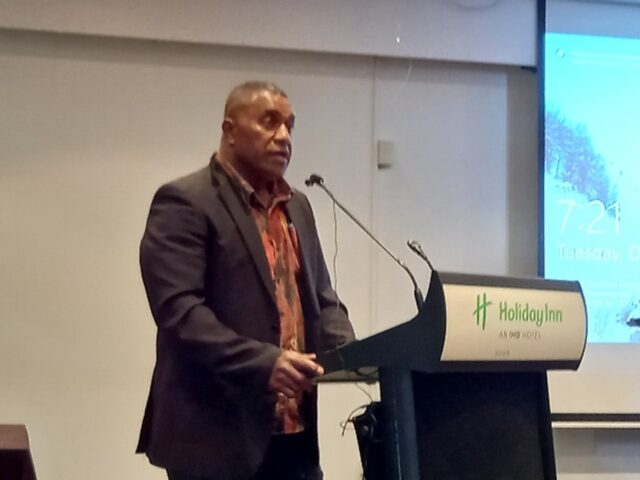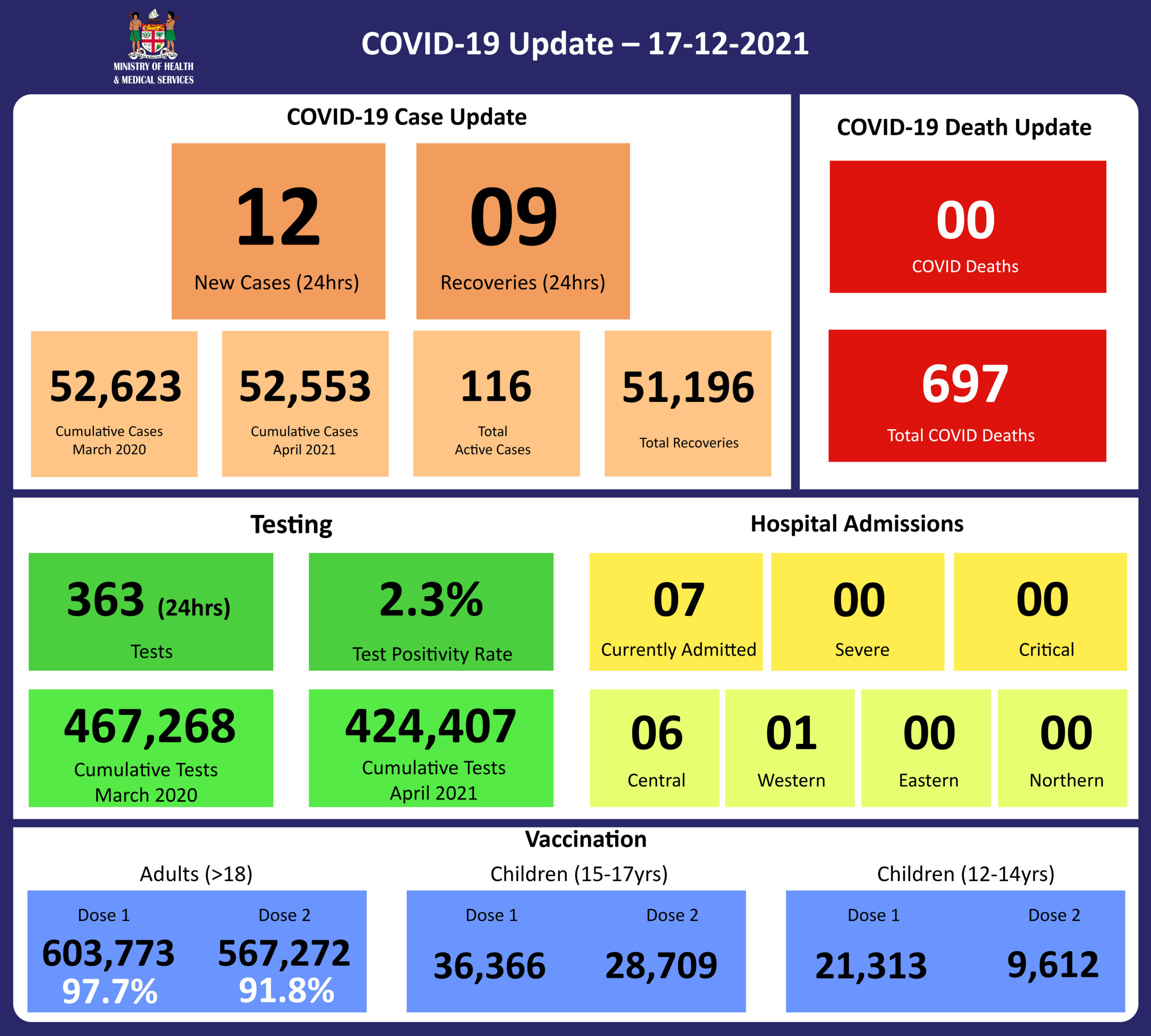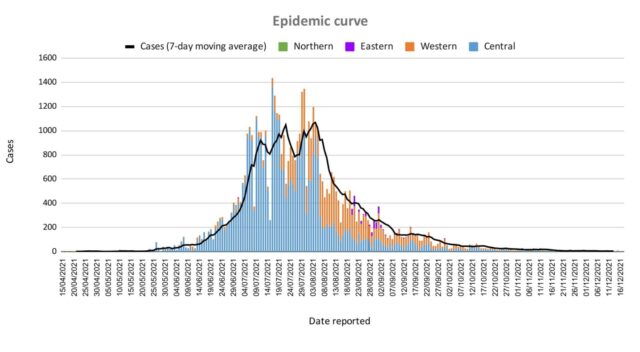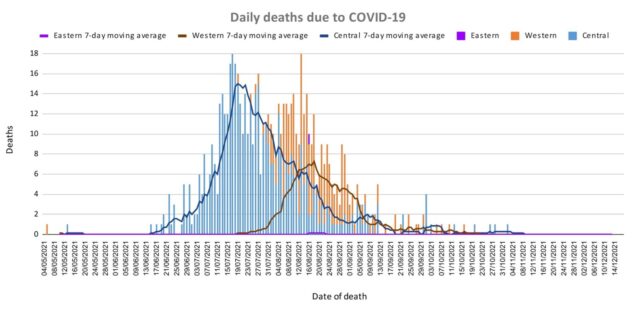COVID-19 Situation Update
Monday 20th December
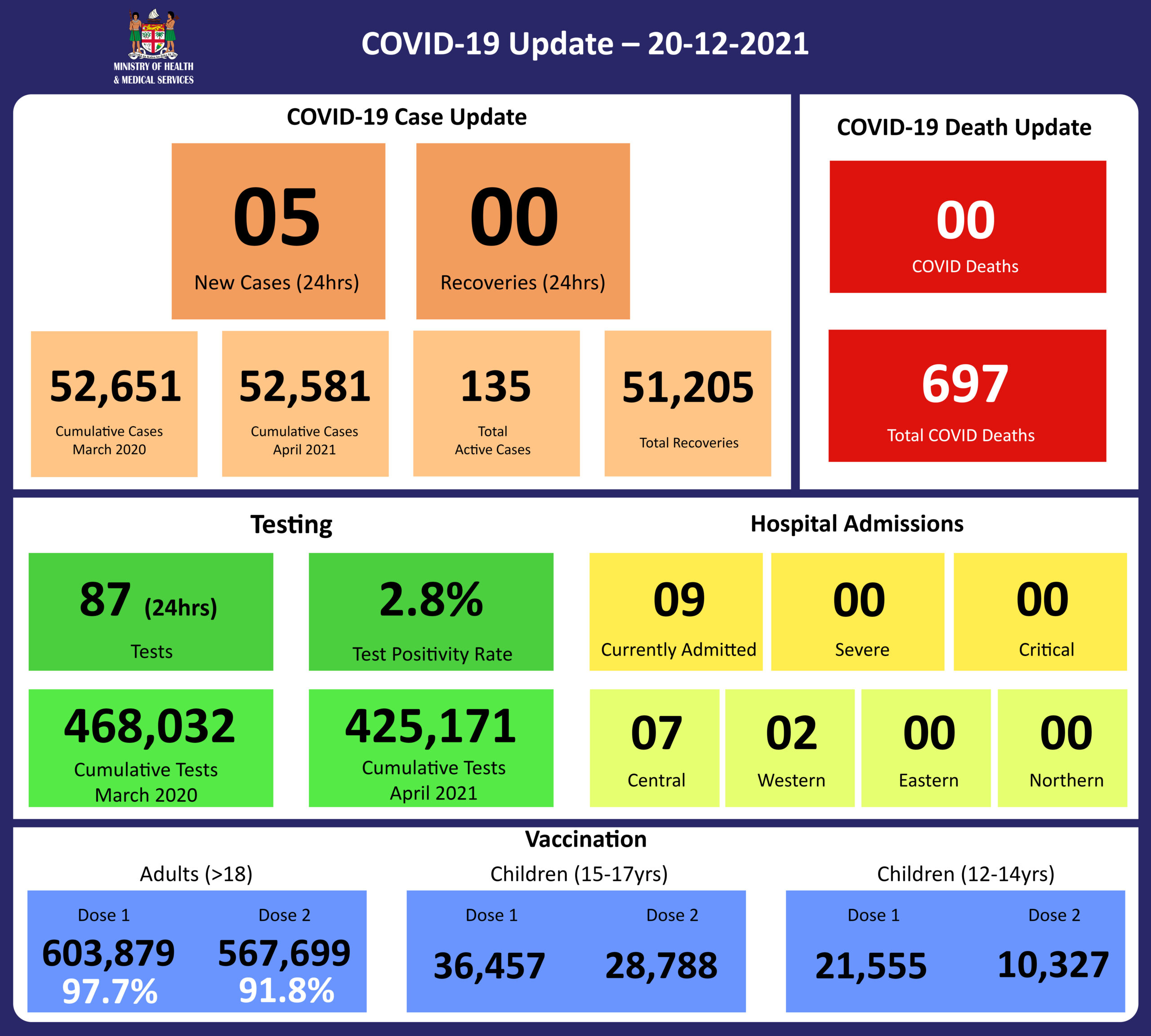
| Transmission Update:
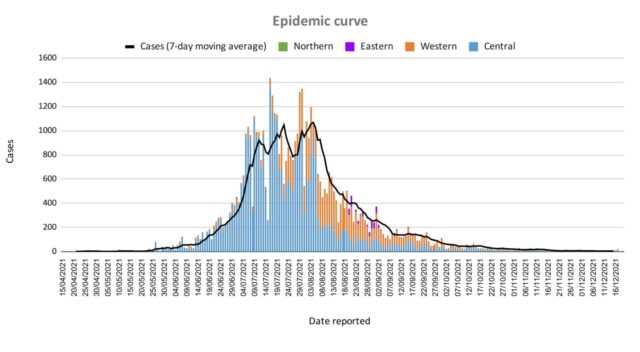 Since the last update, we have recorded a total of 28 new cases; of which 20 new cases were recorded on 18/12/2021, 3 new cases were recorded on 19/12/2021, and 5 new cases in the last 24 hours ending at 8 am this morning. Since the last update, we have recorded a total of 28 new cases; of which 20 new cases were recorded on 18/12/2021, 3 new cases were recorded on 19/12/2021, and 5 new cases in the last 24 hours ending at 8 am this morning.
This epidemic curve depicts the daily positive cases since the 2nd wave of this outbreak that began in April 2021. Overall, for this 2nd wave, there have been 52,581 cases recorded, with 71% of the cases from the Central Division, 28% of the cases from the Western Division, and 1% of the cases from the Eastern and Northern Division.
Our National 7- day rolling average is 6 daily cases calculated for 16th December 2021. |
| Deaths:
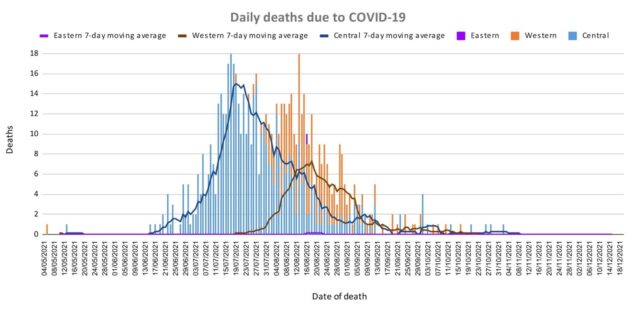 This curve depicts the daily death count by division since the 2nd wave of this outbreak that began in April 2021. Overall, the death rate graphs for the Central and Western Divisions indicate a declining trend. The differences between the Central and Western are similar to the incidence of the daily cases and are likely a reflection of vaccination levels, COVID mitigation measures, and differences in population density. This curve depicts the daily death count by division since the 2nd wave of this outbreak that began in April 2021. Overall, the death rate graphs for the Central and Western Divisions indicate a declining trend. The differences between the Central and Western are similar to the incidence of the daily cases and are likely a reflection of vaccination levels, COVID mitigation measures, and differences in population density.
There is no COVID-19 death to report.
There has been a total of 697 deaths due to COVID-19 in Fiji, with 695 of these deaths during the outbreak that started in April this year. Please note that due to the time required by clinical teams to investigate, classify and report deaths, a 4-day interval is given to calculate the 7 days rolling average of deaths, based on the date of death, to help ensure the data collected is complete before the average is reported. Therefore, as of December 16th, the national 7 days rolling average for COVID-19 deaths per day is 0.0, with a case fatality rate of 1.32%.
We have recorded 612 COVID-19 positive patients who died from serious medical conditions they had before they contracted COVID-19; these are not classified as COVID-19 deaths. |
Epidemic Outlook:
The Ministry of Health continues to monitor the outbreak using indicators such as daily case numbers, hospitalizations, test positivity, and deaths.
Occupancy rates in health facilities, the occupancy rate of ICU beds, death rates, and vaccination coverage are indicators to monitor our health response capacity and we see a decreasing trend across indicators from our health facilities with increasing vaccination coverage for adults and 15-17-year-olds in Fiji. With the commencement of vaccination for 12-14-year-olds, we expect their coverage to contribute to reducing the risk of severe disease, hospitalization, and death.
With international travel open, we anticipate our testing numbers to increase from international repatriates and travelers including Fijians visiting families and friends. With increasing COVID-19 cases in the European region and the emergence of the new variant Omicron, we anticipate continued surveillance and testing at our borders, communities, and maritime islands to monitor and detect cases for early intervention.
Public Advisory:
As Permanent Secretary for Health and Medical Services, I remain extremely concerned at the lack of adherence to COVID safe measures in gatherings throughout the country, especially the non-adherence to masking in indoor public spaces and gatherings in sheds or tents that result in a lot of people sitting close to each other. We ask that all gatherings, including family gatherings during the festive period, observe our COVID Safe measures and as such are restricted in numbers and are done in spaces where good distancing and ventilation can be maintained. The use of fans to ventilate these gatherings, asking that anyone who attends the gathering who does not feel well refrain from attending, and masking up wisely, are all messages that need people to adhere to.
Since the opening of international travel borders to travel partner countries six travelers have tested positive for COVID-19 during the mandatory 3-day hotel stay and testing. In accordance with entry requirements, all cases had tested negative in the 72 hours before departure and are fully vaccinated. All cases are either asymptomatic or have mild symptoms, have been isolated within hotels with protocols that have been established in the lead-up to border opening, and continue to be overseen by MOHMS in the Western Division. The positive samples will be sent to our partner laboratory in Australia for genomic sequencing.
We need to be clear that the objectives of our border measures as they relate to socio-economic recovery. The objective is to reduce the risk of entry of COVID 19 through our borders while allowing for quarantine-free travel from travel partner countries. This includes reducing the risk of entry of variants of concern or at least delaying entry. Mitigation of this risk has also been through the designation of travel partner countries and non-travel partner countries:
- We have ensured that the default quarantine period for all travelers from non-Travel Partner countries is 14 days. In some countries where we have managed to secure oversight over the escalated pre-departure conditions, we have reduced the quarantine period to 10 days. I need to be clear that this escalated program is to reduce the risk of community transmission of an unknown variant.
- The temporary removal of any country from our Travel Partner Country list is already an ongoing assessment process
However, we have noted that a number of our travel partner countries now have widespread community transmission of Omicron. Therefore we are adding to our current border entry requirements for travel partner countries with evidence of community transmission of Omicron by strengthening the pre-departure testing requirement. This will entail reducing the time for when the test can be taken from at most 72 hours before departure to 24 hours. This has already been put in place for travelers from the United States of America and the United Kingdom. We are currently working on how this can also be done for travelers from other travel partner countries.
At the same time, we recognize that the 3-day hotel stay and testing for arrivals from travel partner countries will not completely prevent cases from entering the community, including the Omicron variant. As Omicron is now widespread across the world, including in a number of our travel partner countries, it is very likely that it will also enter our community. The strongest evidence so far is that it transmits better and faster than other variants; people that have been infected with COVID-19 before are getting re-infected with Omicron, and people who have received two doses of a vaccine can also get infected. However, it is still too early to determine whether Omicron causes more or less severe disease, though international experts do expect that prior immunity (including from vaccination) will reduce the risk of severe disease.
What is clear with Omicron is that a ‘Vaccination Plus’ strategy is needed. This means vaccination plus COVID safe measures.
In response to the likely introduction of Omicron into our communities, we have new stocks of booster doses for the elderly, vulnerable, and front liners; and the vaccination of children will continue. We continue to promote COVID safe behavior in our messages and use legal measures we have in our hands for enforcement. We continue to work with businesses and schools to foster COVID safe measures to become an automatic habit.
We want to facilitate the reopening of society in a way that does not cause mass illness and death. We cannot eradicate SARS-CoV-2 but we can plan to ensure that what comes into Fiji is well known and we have enough vaccination cover and COVID safe habits in the community to protect ourselves and the freedoms we enjoy.

